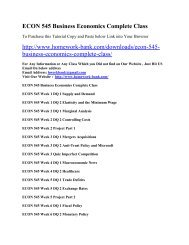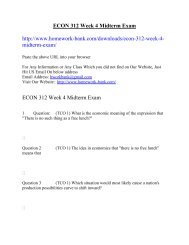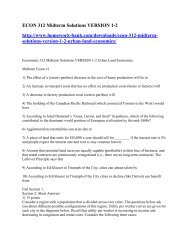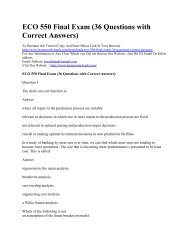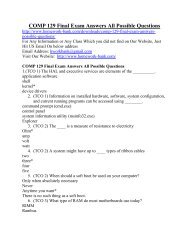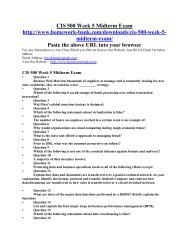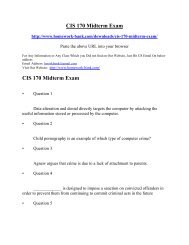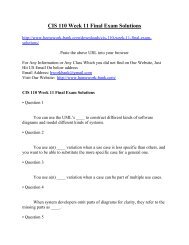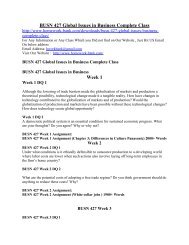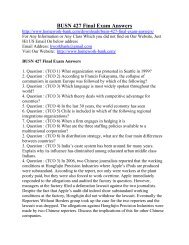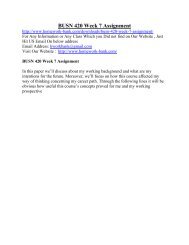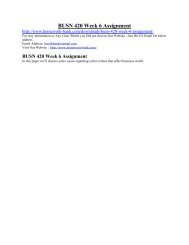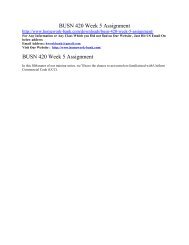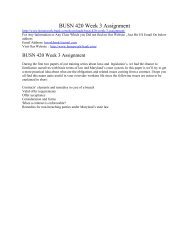o_19i2p1huvvn819gb1m0e21r9vq2f.pdf
For Any Information or Any Class Which you Did not find on Our Website , Just Hit US Email On below address Email Address: hworkbank@gmail.com Visit Our Website : http://www.homework-bank.com/
For Any Information or Any Class Which you Did not find on Our Website , Just Hit US Email On below address
Email Address: hworkbank@gmail.com
Visit Our Website : http://www.homework-bank.com/
You also want an ePaper? Increase the reach of your titles
YUMPU automatically turns print PDFs into web optimized ePapers that Google loves.
BSOP-326 Total Quality Management Week 4 High<br />
Performance Work Systems – Midterm<br />
Copy and paste the URL into your browser<br />
http://www.homework-bank.com/downloads/bsop-326-total-qualitymanagement-week-4-high-performance-work-systems-midterm/<br />
BSOP-326 Total Quality Management Week 4 High Performance Work<br />
Systems – Midterm<br />
1. Question: (TCO 6) An effective leadership system is designed to accomplish all of the<br />
following, except _____.<br />
: encourage initiative and risk taking <br />
set expectations for performance improvement <br />
ensure that organization takes precedence over purpose and function<br />
provide a structure for decision making <br />
2. Question: (TCO 6) Effective strategic development in total quality organizations requires<br />
consideration of all of the following, except _____.<br />
: the details of an organization's resulting resource commitments <br />
the organization's strengths and weaknesses <br />
the organization's mission, vision, and guiding principles <br />
an environmental assessment <br />
3. Question: (TCO 3) The framework for company-wide quality control (CWQC) in Japan is<br />
provided by _____.<br />
: the Shewhart Award <br />
the Grant Award <br />
the Deming Prize <br />
the Baldrige Award <br />
4. Question: (TCO 3) All of the following are true regarding ISO 9000 series, except _____.<br />
: ISO-certified organizations are assured of providing superior product quality<br />
the requirements provide a structure for a basic quality assurance system<br />
the standards describe processes affecting quality <br />
individual sites, not entire companies, must achieve registration individually<br />
5. Question: (TCO 1) A consumer purchases a generic product at a cost of $5.00 instead of the<br />
competing brand-name product that sells for $7.00. The consumer feels that there is no difference in<br />
quality between the generic and brand-name products. This scenario illustrates which of the following<br />
definitions of quality?<br />
: Manufacturing-based <br />
Value-based
Product-based <br />
User-based <br />
6. Question: (TCO 1) During the Middle Ages, quality was built into the final product. This<br />
approach to quality was lost with the advent of _____.<br />
: engineering schools <br />
craft guilds <br />
automation <br />
the Industrial Revolution <br />
7. Question: (TCO 1) Which of the following is most appropriate in describing the quality<br />
efforts used in the early 20th century?<br />
: Defect prevention was emphasized <br />
Quality circles were extensively used <br />
Use of inspection was widespread <br />
Quality was every worker's responsibility <br />
8. Question: (TCO 2) Which of the following systems does not have a role to play in<br />
assuring quality in a manufacturing firm?<br />
: Sales <br />
Purchasing <br />
Product design <br />
None of the above <br />
9. Question: (TCO 2) Services are generally _____ intensive, whereas manufacturing is more<br />
_____ intensive.<br />
: labor, equipment <br />
quality, quantity <br />
input, output <br />
profit, cost <br />
10. Question: (TCO 2) Conditions that facilitate high-quality service employees include which<br />
one of the following?<br />
: Reward systems that recognize cost-cutting behaviors <br />
Work environments that isolate employees from customers <br />
Supervisors who act more as coaches and mentors than as administrators<br />
Specialized job assignments, such as greeting customers <br />
11. Question: (TCO 2) Which of the following is NOT generally true about service<br />
organizations?<br />
: Customers often are involved in the service process. <br />
Services are capital intensive. <br />
Services cannot be stored, inventoried, or inspected prior to delivery.<br />
Services are produced and consumed simultaneously.
12. Question: (TCO 3) Over the years, the Malcolm Baldrige National Quality Award criteria<br />
have been improved to include all of the following shifts in emphasis, except which of the following?<br />
: From supplier quality to supplier partnerships <br />
From a focus on current customers to a focus on current and future customers<br />
and markets<br />
From human-resource utilization to human-resource development and<br />
management<br />
From intra-industry rivalries to intra-industry alliances <br />
13. Question: (TCO 5) Bill designs and maintains the inventory management software<br />
that his coworker John uses when customers call the company to place an order for merchandise. Bill is<br />
John's _____.<br />
: internal customer <br />
external customer <br />
internal supplier <br />
external supplier <br />
14. Question: (TCO 5) Moments of truth are instances when which of the following occurs?<br />
: New products are launched. <br />
A firm is audited. <br />
A customer comes into contact with an employee. <br />
A new competitor enters the market with higher quality.<br />
15. Question: (TCO 7) Which of the following is not considered a hard measure of the<br />
effectiveness of human-resource management?<br />
: Employee satisfaction <br />
Productivity improvements <br />
Cycle-time reductions <br />
Employee turnover <br />
16. Question: (TCO 4) The need to remove barriers to pride in workmanship is<br />
associated with which of the following individuals?<br />
: Crosby <br />
Juran <br />
Deming <br />
Taguchi <br />
17. Question: (TCO 4) The Deming philosophy focuses on improvements in product and<br />
service quality by _____.<br />
: inspecting 100 percent of output <br />
Reducing variation <br />
Reducing customer complaints <br />
Separating the planning and execution functions <br />
18. Question: (TCO 8) The key stages of a team's life cycle include all of the following, except<br />
for _____.
: storming <br />
adjourning <br />
norming <br />
rewarding <br />
1. Question: (TCO 4) Deming's Profound Knowledge consists of four elements. Answer the<br />
following three parts relating to the psychology element of Deming's Profound Knowledge. Your<br />
discussion should reflect this element of Deming's Profound Knowledge and not psychology in general.<br />
1. Discuss why psychology is important for us to understand.<br />
2. Discuss how fear plays a part in this element.<br />
3. Discuss how pay and motivation are of interest in this element.<br />
2. Question: (TCO 1) Explain each of the following statements as they apply to modern<br />
quality management:<br />
1. Customer service is the rule not the exception.<br />
2. The absence of defects is a given rather than a source of competitive advantage.



